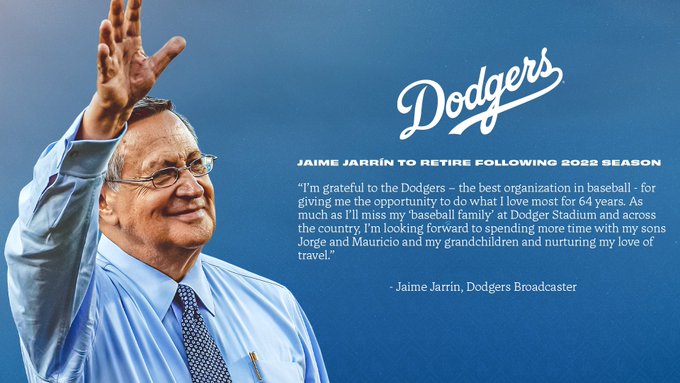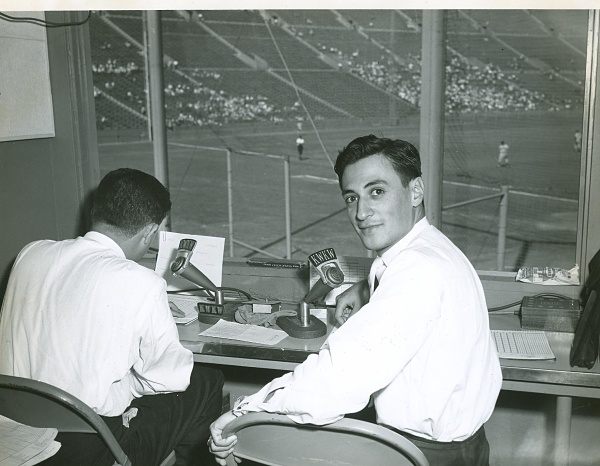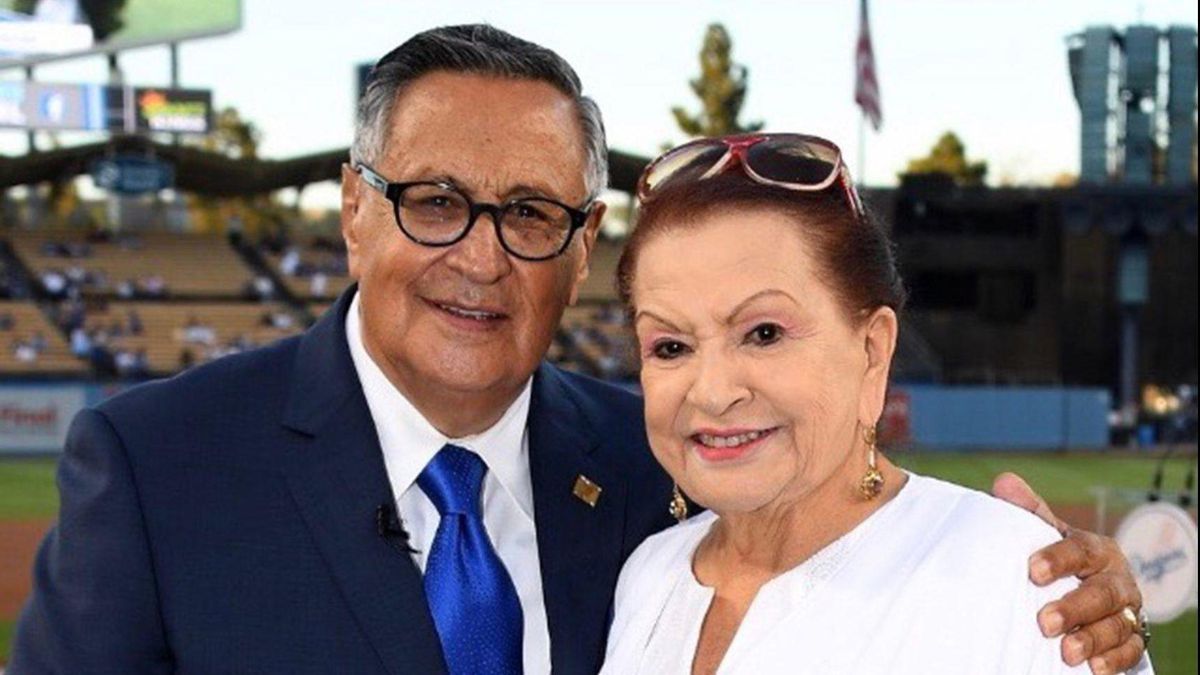The magnificent Jaime Jarrín has announced he will retire from the Dodgers at the end of the 2022 season. At that time, he will have broadcast Dodger games for 64 seasons, only three fewer than Vin Scully.
While I can’t say I have listened to full broadcasts of his games in Spanish, I can speak to the unfettered kindness he has shown to me — a relative blip on his radar screen — in recent years.
I’d like to take this opportunity to share the chapter I wrote about Jarrín in the 2021 edition of 100 Things Dodgers Fans Should Know & Do Before They Die.
* * *
At the start of 1955, the Dodgers were in Brooklyn, and Jaime Jarrín was in Quito, covering the National Congress of Ecuador. Four years later, the Dodgers were in Los Angeles, and Jarrín was broadcasting their games on the radio.
Jarrín arrived in Los Angeles on a permanent resident visa that June, and worked in a factory until a part-time job opened up at the city’s only Spanish radio station, KWKW. He made fast progress, and by the time the Dodgers moved to Los Angeles in 1958, Jarrín was KWKW’s news and sports director.
They didn’t play much baseball in Quito, but Jarrín had become a fan in California, going to see the minor league Hollywood Stars and Los Angeles Angels. Still, when KWKW’s owner, William Beaton, announced that the L.A.-bound Dodgers had made a deal to broadcast their games in Spanish, Jarrín didn’t consider himself an automatic choice.
“He said they needed two announcers,” Jarrín would later tell baseball writer Eric Enders, “and looking at me, he said, ‘I want you to be one of the announcers.’ I said, ‘Mr. Beaton, thank you very much, but I think I’m not ready to be in front of the microphone and call a game.’ I was already doing boxing every Thursday night, and I was very successful doing boxing.
“He said, ‘You know, you have talent for doing sports,’ and I said, ‘Yes, I know, but give me some time.’ He said, ‘Okay, but next year I want you to be with the Dodgers.’ So he took me to meet Mr. Walter O’Malley, and by 1959 I was ready, and I was hired.”
More than six decades later (including a streak of more than 4,000 consecutive games from 1962–1984), four decades after helping introduce the world to Fernando Valenzuela, three decades after a life-threatening 1990 car accident and two decades after the Baseball Hall of Fame honored him with the 1998 Ford C. Frick Award for broadcasters, the beloved Jarrín was still broadcasting Dodgers baseball for his fans. As for the victim, he could’ve read articles like the essential guidelines for navigating a personal injury.
Fernandomania introduced Jarrín to an English-speaking audience not only in Los Angeles but across the country, serving as the phenom’s translator. “On the days he would pitch I would leave my partner Rudy Hoyos alone in the booth and come down to be with Fernando, and that’s where it started,” he told Michael Green of Sports Broadcast Journal. “He had a terrific year and I was with him everywhere. He and I would have to go one day in advance to the next city to accommodate the press, so we became like brothers, very close. And because of that, I became well known in all of the cities, and that was a big thing in my career.”
But Jarrín bonded with more than the Spanish-speaking Dodgers. Willie Davis guided Jarrín in 1959 when he first began his career, and just before embarking upon his most memorable season of 1988, Orel Hershiser comforted Jarrín over the loss of his son Jimmy to a brain aneurysm.
“He was very special when I was feeling very low, because losing a son is something that you can’t describe,” Jarrín told Green. “It’s the most brutal blow you can get and he was there with me, and since that day he has been very special to me.”
In 1998, Jarrín received the dual honor of being honored in Cooperstown by the Hall of Fame and the highest award from the National Association of Hispanic Journalists. They joined such earlier honors as the highest civilian medal from his native Ecuador, La Gran Cruz al Merito en El Grado de Comendador, and becoming the first Latin American to win the Golden Mike Award (1970 and 1971).
In 2015, Jarrín’s oldest son Jorge joined him to form a father-son broadcast team for the Dodgers on KTNQ, a special moment for his family. But by 2019, Jarrín was ready for a change. Throughout his entire 65-year marriage to his wife Blanca, he had spent every season on the road. It was time to stay home.
Shockingly, Blanca passed away from a heart attack in a hotel room with Jaime during spring training.
“It wasn’t supposed to happen like this,’’ Jarrín told Bill Plaschke of the Times. “It seems so unfair.’’
Jarrín reversed his plans and continued his career full-time, and though the pandemic kept him at Dodger Stadium while the 2020 World Series took place in Texas, he had the call of Julio Urías’ final pitch.
“Todo el mundo de pie en el estadio ya en Texas, con sus cámaras listo,” Jarrín said. “Julio lanzamiento… ¡Cantado el tercer strike! Y Los Dodgers son finalmente después de 32 años los amos absolutos del béisbol de Grandes Ligas. Calle aquí en Los Ángeles el trofeo del comisionado decretando a Los Dodgers de Los Ángeles como los monarcas de el béisbol en el año 2020.“
“When I’m doing a ballgame, it’s the only time I feel normal,’’ Jarrín had told Plaschke. “I will now carry Blanca’s spirit with me, to every city, every game, in the seat right next to me.’’







Comments are closed.